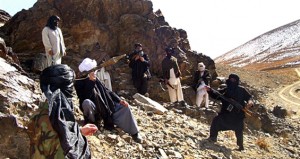Robert Grenier was the CIA’s chief of station in Islamabad, Pakistan, between 1999–2002. He was also the director of CIA’s counterterrorism centre.

When Ahmed Muttawakil, the former Taliban foreign minister, attempted to play an intermediary role between the US and Taliban elements in 2002, he was arrested and imprisoned for his pains.
The author says the Taliban has been closely integrated with al-Qaeda after 9/11
It required many months of cajoling to induce the US department of defence to agree to Muttawakil’s release as an encouragement to others, despite the Afghan government’s stated interest in reaching out to such moderates.
Today, with the fortunes of the government of Hamid Karzai, the Afghan president, and its Western allies at a much more difficult pass, and with the Taliban resurgent in much of the South and East, talk of political engagement with the Taliban is rife.
There are reported meetings between intermediaries and representatives of Gulbuddin Hekmatyar, the leader of Hezb-e-Islami, and discussion of means to reach out to the Taliban is a major feature of the international conference on Afghanistan in London.
Even US military leaders who are working assiduously to attack and “degrade” the Taliban admit that the movement is part of the Pashtun social fabric, and will have to be politically dealt with in some way.
It seems to me, nonetheless, that any sort of meaningful political engagement with senior leaders of the Taliban remains a long way off.
The clear thrust of current Western efforts to reach out to the Taliban is in the context of “reintegration”, through which simple fighters and low-level commanders are induced to return to their communities in return for some form of government assistance.
‘Reconciliation necessary’
The difficulties in this approach are manifest, relying as it must on the involvement of Kabul-appointed government structures, largely seen as corrupt and inept, to mediate and implement such programs.
In view of these difficulties, observers such as Muttawakil argue that a more formal political “reconciliation” with the Taliban leadership will be necessary. Yet it is hard to see how such a political process could be viable.
Relatively low-level discussions including marginal representation from the Karzai government notwithstanding, it seems clear that Taliban leaders, very much to include Mullah Omar, have little interest in negotiating with the Kabul regime, which they see essentially as a puppet.
“It seems clear that Taliban leaders have little interest in negotiating with the Kabul regime, which they see essentially as a puppet.”
Given their growing strength and confidence, they are far more interested in dealing directly with the US to negotiate the terms of a US/Nato/Coalition withdrawal. This hardly suggests a desire on the part of the core Taliban to enter the Afghan political process.
Indeed, can one really imagine the Taliban leadership standing for election in Pashtun-dominated districts, or serving in parliament? They have made clear their religious opposition to such elections.
Instead, reconciliation with the Taliban would amount to acquiescence in the Taliban’s political ascendancy and control in the areas where they are currently active. It is hard to imagine this as anything other than stage-setting for a renewed civil war with the Tajiks and other non-Pushtun minorities.
It is clear that in view of the growing costs, both human and monetary, of the US involvement in Afghanistan, US aspirations there have grown far more modest.
This was the clear thrust of the speech Barack Obama, the US president, gave at the West Point military academy on December 1, 2009.
Repressive policies
The atrophy of US policy goals in Afghanistan would seem to make political acceptance of the Taliban’s socially repressive policies – which appear to be moderating in any case – more viable.
Nonetheless, denial of Afghanistan as a future safe haven for al-Qaeda and others intent on employing terrorist techniques internationally remains a core US objective.
While much is made of the relative moderation of Mullah Omar’s recent statements in favour of a political focus on Afghanistan at the expense of global jihad, it is hard to see these statements – even if taken at face value – as representing anything other than a statement of tactical necessity, rather than of strategic orientation.
It makes all the sense in the world for the Taliban to focus now on its national goals in Afghanistan, and to seek peaceful relations with its neighbours.
The human and monetary cost for the war in Afghanistan is growing,
But once having achieved a measure of uncontested political space in Afghanistan, even if the movement eschews the global jihad for its own account, it is hard to imagine the Taliban coldly refusing all aid to those whom it regards as good Muslims, who are themselves under threat from what it regards as impious regimes backed by foreigners.
Moreover, the current dynamic within the Taliban must be seen in the context of an ever-growing alignment between the Taliban and al-Qaeda, forged under the constant pressure being exerted against them and other like-minded groups in South Asia.
The Taliban has adopted the tactics of al-Qaeda and is far more closely integrated – operationally, ideologically and otherwise – with the Arab-dominated organisation than was ever the case before 9/11.
No political or religious organisation remains static, particularly under the pressure of turbulent events, and the Taliban is no exception.
Its leaders should be watched for signs of willingness to find genuine accommodation, both with other elements and communities in Afghanistan and with outside powers having serious interests at stake in the country.
As of now, however, the relative optimism of those who see the prospect of true political accommodation with the Taliban appears to me to be misplaced.